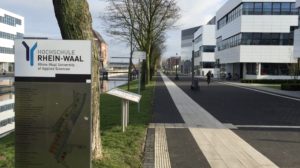The European Union has several projects that explore RRI. One of them, NUCLEUS, is not only exploring the concept itself, but also investigating how it can come into practice. By Berit Viuf

“We want to see change. We have been discussing this for so long and we need some achievement. Now, for the first time, we want to put the theories into a framework to see what will work and what will not work. It is a research project along with the implementation.”
The words belong to Professor Alexander Gerber, Chair of Science Communication at Rhine-Waal University in Germany and Head of Research for the inscico Institute for Science and
Innovation Communication. Gerber is also the project lead of the EU Horizon 2020 project NUCLEUS.
NUCLEUS deals with Responsible Research and Innovation (RRI); in short, a new paradigm of responsibility, moving from an individualist or isolated notion to become a collective approach. RRI is a process where social actors work together during the whole research and innovation process. The social actors are researchers, citizens, policy makers, businesses, third sector organizations, etc. This could align research and innovation with values, needs and expectations of society.
RRI has been discussed for a long time. But few have worked with methods that can put it into action. NUCLEUS aims to create methods that can take the concept from theory into reality.
RRI for dummies
The idea of RRI can be hard to grasp when talked about in academic terms. But really, it is not that difficult.

Imagine coming home and your spouse has bought a new car. It might be an improvement from your old car, but since you had no involvement in the decision process, it is very likely that you will disagree with the choice. You might even disagree although it is rationally the best choice, simply because you were not asked when making the decision.
Science has seen numerous examples of this. For instance, in the childhood of genetic engineering, researchers of GMOs focused on what they saw as benefits of the new technology. However, they neglected to take into account how civil society would react to manipulation of genes, and it turned out that laymen did find such a pervasive new technique highly questionable. It gave the people an impression of a very arrogant scientific environment run by commercial interests, rather than idealism for a better world.
“Am I responsible if I just tell you about my research? Or should I involve you during the process?” Gerber asks.
The disapproval of GMOs basically put public research of genetically engineered crops to an end in the EU. Maybe it was the right thing to do. Maybe not. It is hard to tell, because the potential benefits and risks were not discussed in an open democratic manner. Instead it became two adversaries yelling at each other. The scientists were accused of being cold, manipulative and money-driven, and the NGOs (representing civil society) were called emotional, naïve and irrational. The result: rejection by consumers.
“Innovation must be seen within society as a whole. Is innovation always a good thing? Will it contribute to new jobs or a better environment? Are the advantages big enough to make it the right thing to do for society? These things need to be discussed. Because if they don’t, people might reject good ideas – just because they were not involved,” Gerber says.
With technologies like hydrogen-bombs, GM food, human-animal chimeras, nano-devices, stem cells and CRISPR there is plenty of room for discussion.
The name NUCLEUS is inspired by biological cells. Every cell has a nucleus that takes the dominant role in governing the internal processes in the cell. In the same way that cells are interlinked with other cells around them to form an organism, society is build up by “cells” as well: universities, NGO’s, media, businesses and policy institutions are all interlinked.
NUCLEUS aims to investigate the link between these ‘cells’ and look at best cases as well as obstacles to engage the different stakeholders and ensure RRI processes.
The next step is to develop tools and practical guidelines that can be of use to higher education institutions and science-funding agencies.
“Probably we will only find a few things that work in this project. And some things might work in England, but not in Poland. But we will start a process and it is also important to learn what does not work. The important part is to develop methods that can be tested and further developed also after the project finishes,” Gerber explains.
